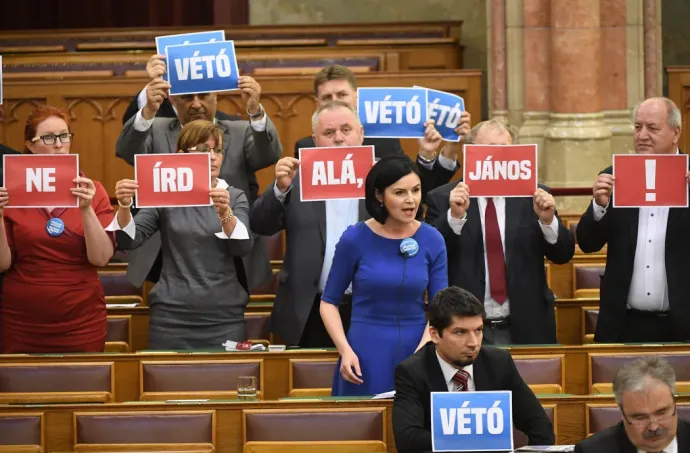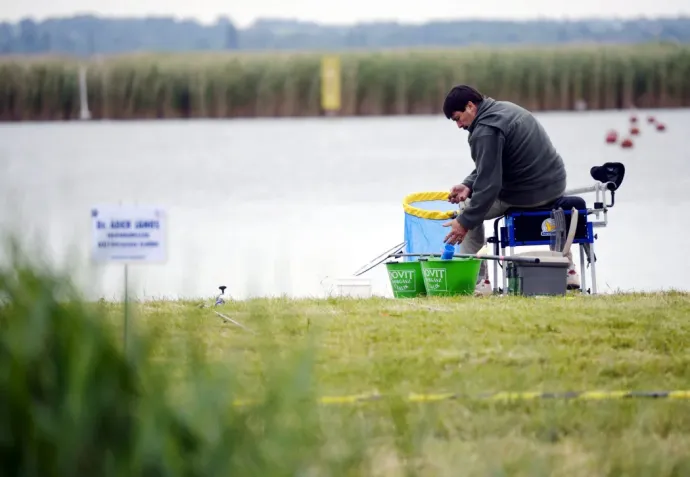The stone-faced president who barely crossed Orbán for ten years is leaving

János Áder, Hungary’s stone-faced president is leaving his post. Following his election in 2012, the former Fidesz group leader tried to annoy Orbán and his gang at times, but after a while he simply signed any law that was placed before him. He never had to work under another government, not once did he listen to the voice of protesters, he preferred to keep quiet about sensitive issues, and chose fishing instead of confrontation. He won’t have a reason for sadness from now on either: he has a renovated villa and a nice pension to look forward to. A look at Áder’s ten years as President of Hungary.
“To you, my compatriots, I promise, that as President of the Republic, I will always represent your interests and values – both at home and abroad. In other words, I will speak up for Hungarian interests and values, for our economic, scientific and cultural values and interests. Let it be known to all Hungarians, that the ornate walls of the presidential palace will not hide my homeland from my view.” – It was with these words that János Áder began his presidential career in 2012, having unexpectedly returned to domestic politics from Brussels.
His is the story of a veteran party politician who became president: he has been executive vice president of Fidesz, he worked as their parliamentary group leader and even as the party’s campaign manager. Although in the mid 2000s he temporarily fell out of favor with Orbán, as a result of which he voluntarily exiled himself to Brussels as an MEP, he ended up returning after a few years, so that following his Fidesz days he could embody the nation’s unity as president. And Orbán thinks that he did an excellent job of this.
Small annoyances
Immediately after being elected, Áder spoke about the unity of the nation and about harmony, and also said: “Once again, I would like to make it clear that I will be working exclusively based on our Fundamental Law. This means that if I receive a hundred impeccable laws from Parliament, I will sign all of them. And if I receive a hundred bad ones, objectionable ones, I will send all one hundred of them back.”
In other words, Áder promised to do that which the law prescribes for the president: “to guard the democratic functioning of the state”. A president has two ways of doing this in Hungary: if he doesn’t like a law which has already been accepted, he can send it back to Parliament to be reworked before he signs it. Although if the law is accepted for a second time without any changes being implemented, he has no choice left but to sign it. On the other hand, if he deems an already passed law to be contrary to the Fundamental Law, the president also has the option of forwarding it to the Constitutional Court. So in theory, Áder could have also functioned as a sort of checking mechanism: in spite of Fidesz having a two-thirds majority, he could have influenced the course of legislation.

His predecessor, Pál Schmitt was famous for signing absolutely anything that was sent to him. Áder, In contrast – especially in the beginning – seemed to not be as eager to stay in line with his party. Although he certainly did not find a hundred objectionable laws, in an interview given to pro-government daily, Magyar Nemzet, he said that
- he had vetoed 37 laws, 28 of them during his first term, and only nine in his second term; he had turned to the constitutional court regarding a law on eight occasions (five times between 2012 and 2017, and three times during his second term).
- Based on all of these, one can hardly say that he gave Orbán much trouble during his presidency. To top it off, in most of the cases he only complained about formal issues and not about the content.
Among the laws sent back there were, however, some that were more painful for Fidesz – such as the Electoral Procedures Act of 2012, which would have introduced electoral registration and restricted political advertising. Or the Land Act of 2015, part of which should have been approved with a two-thirds majority, but this is not what ended up happening. The Constitutional Court ruled in Áder’s favor in both cases, although in the end, he did sign the modified laws in both cases.
He also inflicted a big wound on Orbán’s government in 2016 when he unexpectedly sent the law declaring the finances of the Hungarian National Bank and the National Postal System classified to the Constitutional Court. This started an avalanche. The National Bank had to publish how its foundations are spending 260 billion forints (more than 670 million Euros) worth of public funds, and reports about extravagant spending and huge amounts being paid out to friends and family came flooding in. The case was most uncomfortable for HNB governor, György Matolcsy, but it was still the governing parties who attempted to legalize keeping the whole thing a secret.
The biggest conflict between Áder and the government was caused by the amendment to the law on the easing of well drilling. In 2017, the government wanted to pass a law which would have made it possible to drill a well up until 80 metres of depth without a permit or prior notification, as long as it only served domestic needs. However Áder, who is committed to protecting the environment, was of the opinion that the proposed modification would threaten groundwater resources, so he turned to the constitutional court, which decided that the proposal was unconstitutional. The original, 2017 proposal, which Áder had sent to the Constitutional Court has been republished on the Parliament’s website just a few days ago.
There have also been cases when the strict presidential heart softened and he used his right to veto to help Fidesz get ahead: for example, in 2019, a few Fidesz MPs accidentally pressed the wrong button during voting, and thus ended up NOT supporting a proposal which needed a two-thirds majority approval, and which was about raising the salaries of prosecutors and judges. Afte Áder sent the law back to Parliament “for reconsideration”, the second time around, everyone managed to vote correctly.
Things that didn’t bother him
Áder still preferred to just sign things, and he was rarely touched by the protests staged under his window, or by being called “a mustached shit” by protesters.
For example, in 2013, he signed the fourth amendment to the Foundational Law which included provisions which had previously been declared unconstitutional, and which were a breach to the protection of fundamental rights, and an infringement on the powers of the Constitutional Court. It also included injunctions which kept university students from leaving the country to work abroad after graduation (in case of having received state loans for their studies), as well as a criminalization of the homeless. This is also when it became enshrined in law that the family’s definition begins with marriage and the parent-child relationship, thus stating that childless or same-sex couples do not fit the definition of family in Hungary. At the time, Áder stated that from a legal point of view he couldn’t do anything but sign the law.
Years later, however, he quietly signed the seventh amendment to the Foundational Law. This included the “Stop Soros!” package of laws, which made illegal immigration punishable by law. In 2014 he signed the law about expanding the Paks nuclear plant as well. According to the original plans, the first unit of the new plant was supposed to begin operating in 2023, but the new units (which should be built from a Russian loan) are still nowhere to be seen.
Although there must have been times over the years when Orbán’s confidence in Áder waned, it was not lost, as he was reelected as President of the Republic in 2017 – from then on, he was producing signatures on a large scale. That year he signed the so-called lex CEU, making it impossible for the Central European University to continue operating in Budapest. The name of George Soros once again appeared in the official communication regarding this. Still within the same year, he signed the law about NGOs without qualms. The law stipulates that any NGO receiving at least 7,2 million forints (18 850 Euros) of support from abroad must use the term “foreign-funded organisation” when describing themselves. The campaign for this also included references to George Soros. In the end, the government had to withdraw this law in 2021, as it was declared incompatible with EU law. After this, Fidesz quickly accepted a new law about NGOs.

In 2018 there were huge protests against the proposed “overtime law”, but Áder signed off on it anyway, thus making it possible to raise the number of overtime hours from 250 to 300, or even 400 in case of a collective agreement. Critics have said that it is virtually impossible for an employee in a vulnerable position to say no to this.
After this he signed the law about the Hungarian Academy of Sciences (MTA), which took the research institutes away from the Academy – and he did so in spite of heavy protests from the academics. He also approved the social security law, which invalidates the social security number of those who have not paid their health contributions for three months.
In 2020 he signed the Coronavirus law, which gave the government special provisions in case of a state of danger. This made it possible for the Orbán government to pass all kinds of emergency legislations extremely quickly: such was the modification of the electoral law or the transfer of public funds into foundations. Áder was also quick to sign the law making sex-change operations impossible, as well as the pedophile-law which was hijacked into becoming an anti-LGBTQI law.
Although he did not cross Orbán publicly, there were plenty of things happening behind the scenes. It became public in 2015, that his conversations with the prime minister had made it clear to Áder that the PM is very well-informed about his programmes and all of his meetings. On top of this, a suspicious technical tool had been found at his private residence. Up until that point, Áder’s security team was provided by the counter-terrorism unit – which was (and still is) headed up by János Hajdu who is close to Orbán. After this, “the president’s confidence was shaken”, and the Presidential Guard was established within the Riot Police to protect him.
Last December, investigative journalism center and Telex partner Direkt36 revealed that Áder’s bodyguards had also been targeted with the Pegasus spyware. Why this happened is unclear, but the investigative journalists concluded that “the most likely reason behind this is the conflict which had been going on between the various law enforcement agencies, and which took a bitter turn when the counter terrorism unit wanted to find out details about Áder’s schedule”.
So what DID he do?
While quietly signing laws, Áder did not speak out on divisive issues, and he never went against his former party during his presidency. During the refugee crisis of 2015, for example, he tried to be balanced when speaking about the need for a united front within the EU for this humanitarian and national security issue.
In a speech given during the Covid pandemic, he almost went as far as forming an opinion when he said that “hoping for political gain in this situation is “immoral, inhumane and unacceptable”. Although this could have been true for both sides, once he added that he is asking the political actors “to refrain from causing harm if they are unable to help” he actually reflected the governing parties’ narrative – as this was something that Fidesz had repeatedly thrown at the opposition parties.
Even during his time as MEP, Áder often spoke about the environment, so in 2017, as president he set up an environmental foundation. In spite of this he had nothing to say in early 2019, when the Hungarian government appealed to the European Court of Justice against the tightening of environmental limits for nitrogen oxides in ambient air. Following the outbreak of the pandemic, he and his wife set up another foundation – this time for helping children who have become orphaned due to Covid. Experiences about the foundation’s activities have been mixed.
The “busó” retires
A president’s life is about more than politics and signing laws: at times even Áder looked beyond the walls of the presidential palace. Besides his career he always had time for his great love: fishing. He even mentioned it during his inauguration stating that he does not intend to give up his childhood passion. And it was worth it: in 2013 he became the ambassador for fishing. He claims that this water sport improves one's clarity of vision by "getting to know the green of nature and the blue or rather the angry green of the water".

And if this were not enough for him, in the years that followed he managed to cross new milestones: he was knighted in London, and even declared an honorary “busó” (a person wearing a special mask during carnival season in the Hungarian town of Mohács) in Mohács. This even managed to put a smile under the mustache of the always sombre, perhaps a little sour-faced Áder.
He may also rejoice because although he is saying goodbye to working, he will have plenty of money for buying bait, as he is leaving with tens of thousands of Euros worth of savings. On top of this, he is leaving at a relatively young age, as his predecessors were elected when they were around the age he is now. There will be no reason for sadness at all: on top of an 11 500 Euro monthly pension, he is moving into a villa in the Buda hills where he can reside until the end of his life and which the state has renovated for him for close to a billion forints (2,6 million Euros).
The baton will now be passed to the new head of state, Katalin Novák, who was also groomed by Fidesz.
If you liked this article, and don't want to miss other similar content from and about Hungary, make sure to subscribe to the Telex English newsletter!